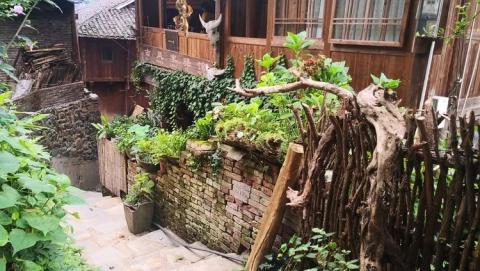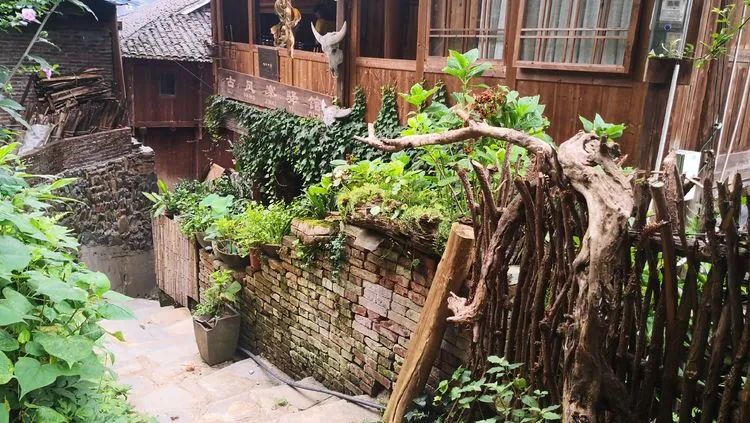
The shuttle bus stopped at a fork in the road. Tourists who got off the bus were guided to the left. Seeing that we had come to stay in large and small bags, we were told to go to the right.
When we walked to the central square of the village, what greeted us was not the owner of the B&B but the strong rustic atmosphere of livestock.
We booked the B&B on Ctrip. We told the B&B owner early about our arrival time, but there was no one at the B&B. The boss goes out to work, and the wife goes out to do shopping.
Following the boss's instructions on the phone, we found a B&B called "Gufengzhai Inn" under a few stone stairs next to the square. The boss asked us to open the door and go in by ourselves. This gate is also the fence of Bamboo Basilica.
It’s another place that’s open all night.



We left our luggage and walked around the square.


The family rules engraved on wooden boards are on the wall, and the village rules engraved on stone tablets are on the ground.
The village rules are very interesting. For example, it stipulates that men are not allowed to wear buns, are not required to use shotguns, and are liable for breach of contract if they do not plant a tree when giving birth or passing away. The penalty for breach of contract is "three 66" (66 jins of pork, 66 jins of rice, 66 jins of rice wine)




A group of little girls in costumes walked out of a primary school not far from the village committee. "Are you going to perform?" "No, it's our graduation ceremony," they told us cheerfully. The girls graduated from elementary school.



It was almost lunch time and we went to a restaurant where there was an old man with an extraordinary temperament. When he sat with his granddaughter, he had a kind look on his face. When standing with arms akimbo, he looks majestic. He is a well-known man, 78 years old. He served as a soldier in Beijing in the 1950s and later returned to the village to become the village chief secretary. Abdicate now. Now the eldest son is the village chief, and the second son runs the restaurant. The second son said that he once worked in a restaurant in Zhangjiajie. After the epidemic, the restaurant had no business, so he returned to the village.

He told us about his experience as a soldier and about Basha's gun. Six guns of different lengths were hung on the wall of his house.



He was loading and firing a gun on the hillside like a naughty boy.




In the afternoon, in order to watch the show, we returned to the place where we got off the ferry in the morning and entered the tourist passage on the left. There is a gate for ticket inspection at the entrance of the passage. The show starts at 3 o'clock. Villagers who were actors came one after another to wait for the performance.

There is a welcome ceremony at the entrance of the village. After the guests enter the village with a gunshot, a full-time commentator takes the tourists into the village to the performance square, introducing some of Basha culture along the way.
Passing through a lush forest.

The tree of life that rolled towards him was the old village chief, and people called him King Miao.


The performance was held on a small flat land in the village. It included sheng playing, gun dancing, Miao dance, wedding, head shaving with a sickle, etc., and lasted for about half an hour.

Whether they are performing after the show or waiting on the sidelines, the cheerful smiles on their faces tell you that this is how they entertain themselves.




Women pay more attention to the flowers embroidered on their own hands.



Shaving one's head with a sickle is probably the only one in the world. One person was shaved on the spot for every performance, two times a day, and there were a total of 2,000 people, men, women, and children in the entire tribe. People couldn't help but ask: How did this happen?


After shaving, the top bun must be left on.

The last shuttle bus leaves at 5:30. As soon as the show ended, tourists hurried to find the shuttle bus. The village was quiet again.

I originally planned to follow the villagers who returned home to visit other villages, but as I walked down the mountain along the path, one house after another, one after another, it seemed that there was no end.

He turned back and bought the vegetables that had just been picked from the burdens of these two people. Plus a free-range chicken and dinner cooked for us by the hostess of the B&B, it tasted like home.



In the early morning, I was woken up by the crowing of roosters. After a period of silence, the clear chirping of birds sounded again in the valley. Opening the window, a beautiful picture unfolds: the morning sun is shining, the morning mist is lingering among the rolling mountains, and the mountains are green with pines and cypresses.
The flute solo piece "Morning in Miaoling" came out from the depths of my memory.
We were glad that we stayed in Miaoling for one night and stayed at the Gufengzhai Inn where we could see the view from the windows.







Basha, the last gunman tribe in China.
Although the gun is held in the hand and hung on the waist, it has lost its hunting function.
Basha, a tribe that regards trees as gods.
A tree is born, and a tree dies. As long as the big tree is there, their lives are there.
